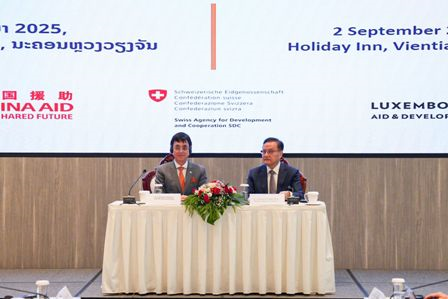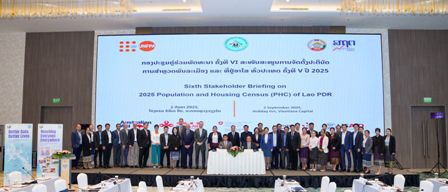ຂປລ
The Lao Statistics Bureau (LSB), the Ministry of Finance, convened the Sixth Stakeholder Briefing on the 2025 Population and Housing Census (PHC) today, bringing together representatives from government ministries, embassies, UN agencies, development partners, and other key stakeholders. The briefing provided an opportunity to review progress, celebrate achievements, identify challenges, and align priorities ahead of the historic census.

(KPL) The Lao Statistics Bureau (LSB), the Ministry of Finance, convened the Sixth Stakeholder Briefing on the 2025 Population and Housing Census (PHC) today, bringing together representatives from government ministries, embassies, UN agencies, development partners, and other key stakeholders. The briefing provided an opportunity to review progress, celebrate achievements, identify challenges, and align priorities ahead of the historic census.
The 2025 PHC—the fifth national census and the first-ever digital census in Lao PDR—represents a once-in-a-decade opportunity to generate essential data that will guide national policies and drive sustainable development. Participants emphasized the importance of strong partnerships, enhanced coordination and continued support to ensure the census is implemented effectively and on time.
Opening the meeting, Mr Santiphab Phomvihane, Minister of Finance, highlighted the strategic importance of the census. He noted that its results will be instrumental in evaluating the implementation of the 9th National Socio-Economic Development Plan (2021–2025) and will provide a critical baseline for the upcoming 10th Plan (2026–2030), set to be endorsed next year.

“As the chair of today’s meeting, I wish to extend my sincere gratitude to UNFPA, development partners, and international experts for their continued technical and financial support,” said Minister Santiphab. “Your partnership is essential to the success of this national priority.”
Ms. Phetsamone Sone, Head of the Lao Statistics Bureau, reported that census preparations are in their final stage, with full-scale field data collection scheduled to begin on 3 November 2025, lasting six to eight weeks. She highlighted key milestones, including the development of inclusive census questionnaires, completion of the pilot census, ongoing GIS-based delineation of Enumeration Areas, and the training of master trainers to be completed by Sept 5, followed by enumerator training in late October 2025. She emphasized that the quality of training is critically important to ensuring the accuracy and reliability of the Census.”
Dr. Bakhtiyor, UNFPA Representative underscored the significance of partnership in supporting the Lao government to carry out the first-ever digital census in the Lao PDR.
"For UNFPA, the census is not only about data collection—it is a collective effort and a shared commitment to support the Lao PDR in achieving the Sustainable Development Goals, ensuring that no one is left behind,” he said. “UNFPA believes that high-quality data is essential to shape policies that reach those who need them most, especially women, girls, and young people striving for empowerment.
He further noted that reliable, disaggregated population and census data are essential for identifying and reaching those most in need, as population data provide the denominators for up to 107 of the 232 SDG indicators, making geographically precise census data indispensable for targeting interventions and tracking progress.
With significant contributions from the Lao government and development partners through UNFPA, the funding gap has been reduced, however there is still a need for additional US$ 824,000 to ensure that the census training and data collection processes will be implemented timely and in good quality.
As the country’s first-ever digital census, the 2025 PHC marks a milestone in modernizing the Lao statistical system. By applying advanced technologies—including Computer-Assisted Personal Interviewing (CAPI) and GIS-based mapping—the census will deliver faster, more accurate, and timely data to inform evidence-based policy and decision-making.
KPL